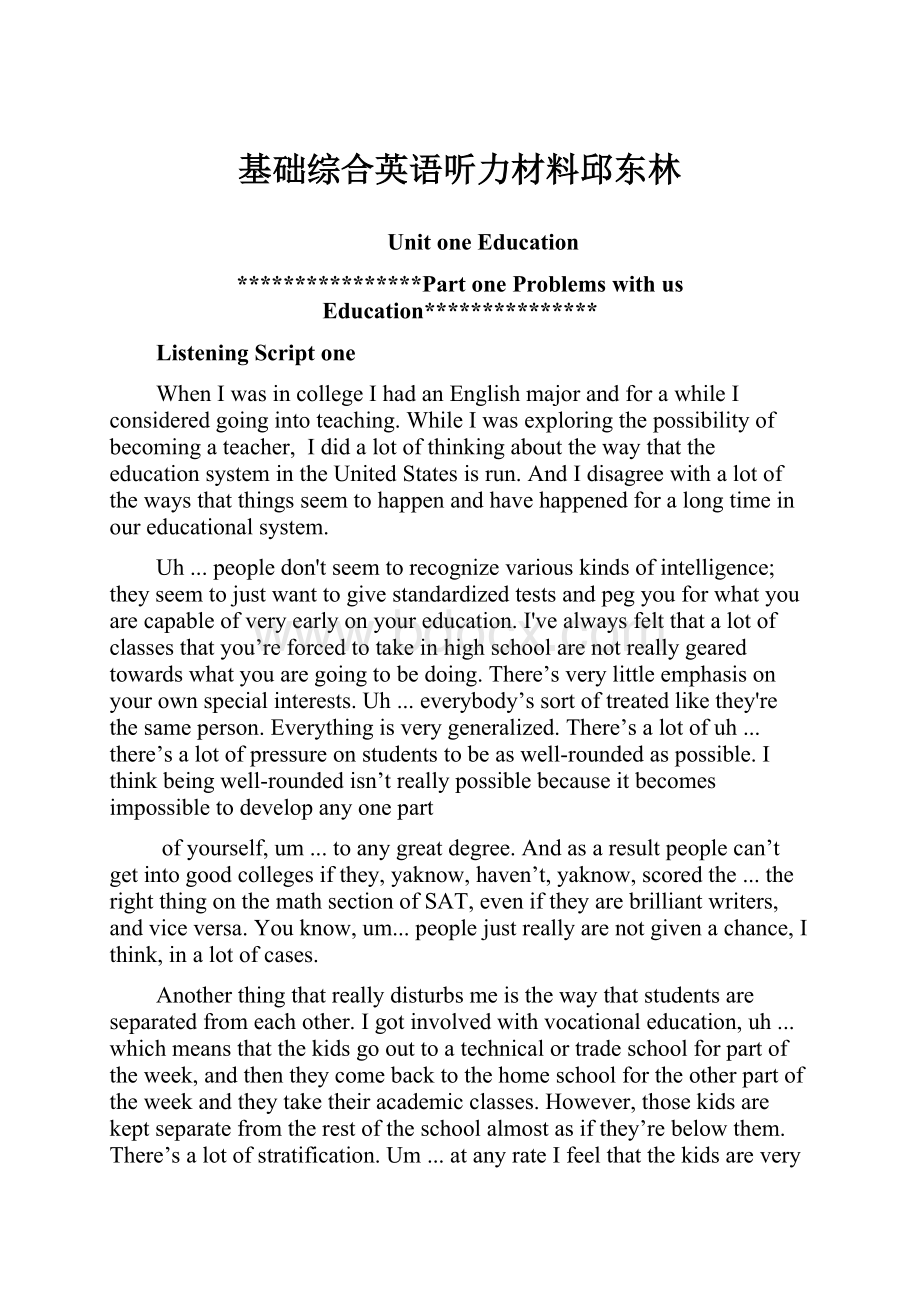基础综合英语听力材料邱东林.docx
《基础综合英语听力材料邱东林.docx》由会员分享,可在线阅读,更多相关《基础综合英语听力材料邱东林.docx(79页珍藏版)》请在冰豆网上搜索。

基础综合英语听力材料邱东林
UnitoneEducation
****************PartoneProblemswithusEducation***************
ListeningScriptone
WhenIwasincollegeIhadanEnglishmajorandforawhileIconsideredgoingintoteaching.WhileIwasexploringthepossibilityofbecomingateacher,IdidalotofthinkingaboutthewaythattheeducationsystemintheUnitedStatesisrun.AndIdisagreewithalotofthewaysthatthingsseemtohappenandhavehappenedforalongtimeinoureducationalsystem.
Uh...peopledon'tseemtorecognizevariouskindsofintelligence;theyseemtojustwanttogivestandardizedtestsandpegyouforwhatyouarecapableofveryearlyonyoureducation.I'vealwaysfeltthatalotofclassesthatyou’reforcedtotakeinhighschoolarenotreallygearedtowardswhatyouaregoingtobedoing.There’sverylittleemphasisonyourownspecialinterests.Uh...everybody’ssortoftreatedlikethey'rethesameperson.Everythingisverygeneralized.There’salotofuh...there’salotofpressureonstudentstobeaswell-roundedaspossible.Ithinkbeingwell-roundedisn’treallypossiblebecauseitbecomesimpossibletodevelopanyonepart
ofyourself,um...toanygreatdegree.Andasaresultpeoplecan’tgetintogoodcollegesifthey,yaknow,haven’t,yaknow,scoredthe...therightthingonthemathsectionofSAT,eveniftheyarebrilliantwriters,andviceversa.Youknow,um...peoplejustreallyarenotgivenachance,Ithink,inalotofcases.
Anotherthingthatreallydisturbsmeisthewaythatstudentsareseparatedfromeachother.Igotinvolvedwithvocationaleducation,uh...whichmeansthatthekidsgoouttoatechnicalortradeschoolforpartoftheweek,andthentheycomebacktothehomeschoolfortheotherpartoftheweekandtheytaketheiracademicclasses.However,thosekidsarekeptseparatefromtherestoftheschoolalmostasifthey’rebelowthem.There’salotofstratification.Um...atanyrateIfeelthatthekidsareveryawareofthewaythatthey’reperceivedbytheeducators,bytheirteachersand,yaknow,bytheirpeers.AndIthinkthatit...itcausesthemtoactinawaythat...is...notreallyoptimal.Andthat’sprettysadtome.IactuallyhadkidstellmewhenIwasteachingthem,“yaknow,we’rethejustbadclass;we...yaknow,it’snotthatwehaveaproblemwithyoupersonally;yaknow,wearejustbad.Wearebadkids”becauseprettymuchthatwaswhattheyfelttheywere.Andyaknow,theirclasseswereverylimiting,uhtheteachersnevertrytodoanythingcreativewiththoseclasses.Ithinkthatmanyofthekidsinthatclasswereintelligent,butneveractuallyrealizedtheirpotentialbecauseofthewaytheyweretrackedveryearlyontheireducation.
ListeningScripttwo
MargaretWarner:
Mr.Unz.Whydoyoubelievethatbilingualeducationshouldbescrapped?
RonUnz:
Well,theoverwhelmingpracticalevidenceisthatbilingualeducationhasfailedoneverylargescalecasethat’sbeentriedintheUnitedStates,inparticularinCalifornia.TheoriginsofthisinitiativewasthecaselastyearofalotofimmigrantLatinoparentsindowntownLA,whohadtobeginapublicboycottoftheirlocalelementaryschooltotrytoforcetheschooltogivetheirchildrentherighttobetaughtEnglish,whichtheschoolwasdenying.AndIthinkthatreallyopenedmyeyestothecurrentstateoftheprograminCalifornia,wherethestatisticsaredreadful.
MargaretWarner:
Mr.Lyons.
JaniesLyons:
Itisnotthecasethatbilingualeducationisfailingchildren.Therearepoorbilingualeducationprograms,justastherearepoorprogramsofeverytypeinourschoolstoday.Butbilingualeducationhasmadeitpossibleforchildrentohavecontinuousdevelopmentintheirnativelanguage,whilethey'reintheprocessoflearningEnglish,somethingthatdoesn'thappenovernight,andit’smadeitpossibleforchildrentolearnmathandscienceatarateequaltoEnglish-speakingchildrenwhilethey’reintheprocessofacquiringEnglish.
MargaretWarner:
Mr.Unz,whataboutthatpoint—forthesechildrenwhodon'tspeakEnglishwelltheywillfallbehindinthebasicsubjectsiftheycan'tbetaughtthoseinSpanish,orwhateverlanguage?
Ishouldn’tsay
justSpanish,butwhatevertheirfamily’slanguageis.
RonUnz:
That’saveryreasonablepoint.Andtotheextentthatwe’retalkingaboutolderchildren.14or15yearoldswhocometotheUnitedStates,don'tknowanyEnglishandareputinthepublicschoolsIthinkaveryreasonablecasecanbemadeforbilingualeducation.Idon’tknowifit’scorrect,butatleastyoucanmakeacaseforit.Butmostofthechildrenwe'retalkingaboutenterCaliforniaorAmericapublicschoolswhenthey’refiveorsixorseven.Attheageoffiveyearsold,theonlyacademicsubjectsachildisreallydoingisdrawingwithcrayonsorcuttingand,youknow,withpaperandthattypeofthing.Andatthatagechildrencanlearnanotherlanguagesoquicklyandeasilythattheonlyreasonablethingtodoistoputtheminaprogramwherethey'retaughtEnglishasrapidlyaspossibleandthenputintothemainstreamclasseswiththeotherchildrensotheycanmoveforwardacademically.
MargaretWarner:
Thereissomethingtothatpoint,isn’tthere,Mr.Lyons,thatveryyoungchildrendoabsorblanguagesveryquickly?
JamesLyons:
Theyabsorbcertainfacetsoflanguageveryquickly.TheylearntospeakinanunaccentedformlikeanativeEnglishspeaker.Buttheresearchshowsthatactuallyadultsaremuchmoreefficientandquickerlanguagelearnersthanchildrenbecausethey'reworkingfromabroaderlinguisticbase,agreaterconceptualbase.IreallytakeobjectiontowhatMr.Unzissayingthatchildrenattheageoffive,six,andsevenareonlycoloringandcuttingoutpaper.Thatisn'tgoingtoleadtothehigh
standards.
*********************ParttwoArtsEducation*******************
Listingscriptone
Interviewer:
ProfessorGardner,whatdidyoufindinyourstudiestobethebiggestdifferencebetweenartseducationintheUnitedStatesandartseducationinChina?
Whatstruckyoumost,then?
Gardner:
IwassostruckbythedifferencesbetweenartseducationintheUnitedStatesandartseducationinChina.USyoungsterslovetoexploreandthinkthattheyexploreverywell;andyet,withouttherequisitediscipline,theirproductsaretypicallyoflittleinterest—exceptperhapstotheirdotingparents.
EducationinalloftheartsinChinaisverypreciselyprescribed.Teachersandparentsknowexactlywhattheywantchildrentobeabletodoandtheyknowhowtogetthedesiredbehaviourandperformanceinalmostperfectfashion.Ontheotherhand,thereislittlefreeexploration.
ButImustaddanothersurprise.WhenyoungchildreninChinaweregivenanoveltaskinthearts,theyperformedverywell.BeforevisitingChina,Ihadthoughtthatyoungpeoplemustalwaysbeginwithaperiodoffreeexploration,beforetheybegintoacquiredisciplineandskills.AftervisitingChinaandthinkingaboutwhatIhadseen,Icametoadifferentconclusion.Itisnot
importantthatone"explore"first;whatisimportantisthatonehasasignificantperiodforexploration,eitherbefore,during,orafteronehasacquiredsomediscipline.
Interviewer:
Asyoumighthavenoticed,thesedaysafter-schoolclassesinmusic,dance,paintingandcalligraphyareverypopularinChina,althoughmanyofthe"youngemperors"mightnotbesowillingtolearnallthese"extraskills."What'syouropiniononthis?
Gardner:
Thefewerchildrenyouhave,andthemoreresourcesatyourdisposal,themorelikelyyouaretogiveyourchildreneveryformofenrichment.Chinahasthousandsofyearsofhistoryofencouragingtalentdevelopment,soitisnotatallasurprisethatmanykidsaretakingafter-schoolartsclasses.Butwhatchildrendowhentheirparentspushthem,isverydifferentthanwhattheydowhentheygrowup,andtheirparentsarenolongerincontroloftherewardsandpunishment.Byandlarge,thosegrownupstudentswhocontinuetheirareaoftalentarethosewhousethetalentprofessionallyandthosewhogainintrinsicpleasurefromtheactivity.
Interviewer:
Inrecentyears,artmuseumsandcommunityartscentreshavebeenmushroominginChinaasthecountryexperiencesrapidmodernizationandinternationalization.HowdoyoubalanceartseducationinschoolsandartseducationbeyondschoolWalls?
Gardner:
Itisentirelytothegoodthatstudentsnowhaveopportunitiesto
learnabouttheartsoutsideofclass—inmuseums,inchildren’spalaces,throughtheelectronicmedia,communitycentres,andoutdoorinstallations.Veryoftenchildrenlearnmuchmorecomfortablyandpersonallyinwhatwecall“informaleducationalsettings.”
Optimally,thereshouldbeadivisionoflabourbetweenschoolsandinformalsettings.Asjustoneexample:
Schoolscouldfocusmoreonprovidinghistoryandculturalbackground—whereasmuseumsmightprovidetheopportunitytolearnaboutspecialtopics,orprobeintoatopicmoredeeply.
ListeningScripttwo
Ann:
Doyoufindthere’smuchopportunity...todootherthings,besidesstudying,duringterm-time?
Imean,ifyouhavea,averyacademiccourse,yousaythesociallifeisgood,butyoumightnotalwayshavetimeto,er,enjoyit,ifyou...havealot...
Ian:
Notbeingaveryacademiccourse,Iwouldn’tknow.
Ann:
Howaboutyou,Tony?
Tony:
Isuppose...abusinesscourseisn’tparticularlyacademic,ifyoulike,but,er,Icertainlyfindquiteenoughtimetodonewspapersand...allIwanttodoonthesocialside.[Yes]Gotodancesandso,on.
Ian:
Butthenyouworktillfiveinthemorning,don’tyou?
[Laughter]
Tony:
Let’snotbringpersonalitiesintothis!
Ann:
D'youthinkthat